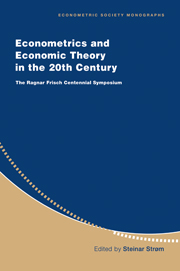Book contents
- Frontmatter
- PART I RAGNAR FRISCH AND HIS CONTRIBUTIONS TO ECONOMICS
- PART II UTILITY MEASUREMENT
- PART III PRODUCTION THEORY
- PART IV MICROECONOMIC POLICY
- PART V ECONOMETRIC METHODS
- PART VI MACRODYNAMICS
- PART VII MACROECONOMIC PLANNING
- 17 The Influence of Ragnar Frisch on Macroeconomic Planning and Policy in Norway
- 18 How Frisch Saw in the 1960s the Contribution of Economists to Development Planning
- 19 On the Need for Macroeconomic Planning in Market Economies: Three Examples from the European Monetary Union Project
- Author Index
- Subject Index
17 - The Influence of Ragnar Frisch on Macroeconomic Planning and Policy in Norway
from PART VII - MACROECONOMIC PLANNING
Published online by Cambridge University Press: 05 January 2013
- Frontmatter
- PART I RAGNAR FRISCH AND HIS CONTRIBUTIONS TO ECONOMICS
- PART II UTILITY MEASUREMENT
- PART III PRODUCTION THEORY
- PART IV MICROECONOMIC POLICY
- PART V ECONOMETRIC METHODS
- PART VI MACRODYNAMICS
- PART VII MACROECONOMIC PLANNING
- 17 The Influence of Ragnar Frisch on Macroeconomic Planning and Policy in Norway
- 18 How Frisch Saw in the 1960s the Contribution of Economists to Development Planning
- 19 On the Need for Macroeconomic Planning in Market Economies: Three Examples from the European Monetary Union Project
- Author Index
- Subject Index
Summary
Introduction
To understand why and how Ragnar Frisch influenced macroeconomic planning and policy, his basic political and professional views must be kept in mind. He was very critical toward the free market system, about which he expressed moral indignation. Thus in 1932 he observed that “it is an unworthy situation that people amidst a world of real abundance shall live in an economic system that with regular intervals creates suffering and anxiety for almost all groups of the population” (Frisch, 1932a, p. 139). In 1949 he made the observation that “the mass unemployment prevailing in most countries during the 1930s, led to a monstrous situation. Standards of living declined in the midst of plenty. Food and other consumption goods were deliberately destroyed while people hoped and prayed that something would turn up that would finally allow them to use their own labour for the satisfaction of their own wants” (Frisch, 1949b, p. 4). Such situations had to be prevented by “some sort of overall national planning,” without which a “simultaneous realization of social justice and a high rate of economic growth is impossible” (Frisch, 1963a, p. 21).
Frisch was convinced that to make such a combination possible, economists could play a major role. Their role should be to clarify the state of the economy and to explore the means required to achieve goals determined by policy-makers. Economists should not impose their own preferences upon the politicians. He emphasized the moral importance of this distinction in many contexts. Already in one of his early courses at the University in Oslo, Frisch urged the students to distinguish sharply between scientific statements and value judgments.
- Type
- Chapter
- Information
- Econometrics and Economic Theory in the 20th CenturyThe Ragnar Frisch Centennial Symposium, pp. 531 - 559Publisher: Cambridge University PressPrint publication year: 1999



